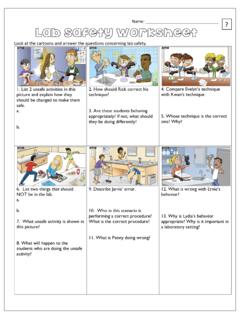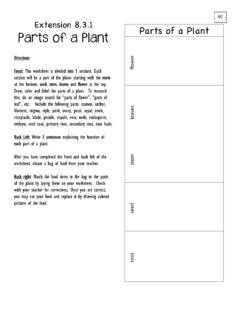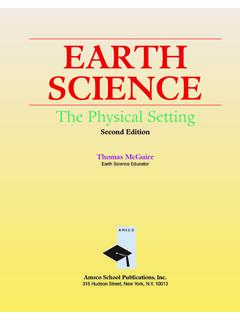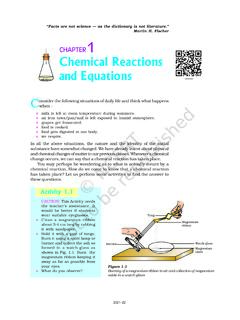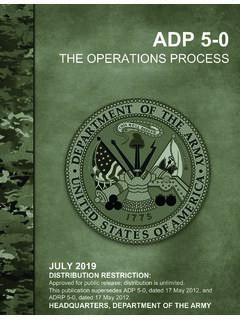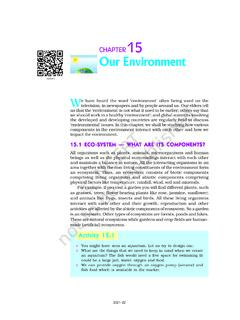Transcription of 8th Grade Science - DIXIE MIDDLE SCHOOL SCIENCE
1 8th Grade SCIENCE Utah OER DOE. Say Thanks to the Authors Click (No sign in required). AUTHOR. Utah OER DOE. To access a customizable version of this book, as well as other interactive content, visit CK-12 Foundation is a non-profit organization with a mission to reduce the cost of textbook materials for the K-12 market both in the and worldwide. Using an open-source, collaborative, and web-based compilation model, CK-12 pioneers and promotes the creation and distribution of high-quality, adaptive online textbooks that can be mixed, modified and printed ( , the FlexBook.)
2 Textbooks). Copyright 2016 CK-12 Foundation, The names CK-12 and CK12 and associated logos and the terms FlexBook and FlexBook Platform (collectively CK-12 Marks ) are trademarks and service marks of CK-12. Foundation and are protected by federal, state, and international laws. Any form of reproduction of this book in any format or medium, in whole or in sections must include the referral attribution link (placed in a visible location) in addition to the following terms. Except as otherwise noted, all CK-12 Content (including CK-12. Curriculum Material) is made available to Users in accordance with the Creative Commons Attribution-Non-Commercial Unported (CC BY-NC ) License ( licenses/by- ), as amended and updated by Creative Com- mons from time to time (the CC License ), which is incorporated herein by this reference.
3 Complete terms can be found at terms-of-use. Printed: June 28, 2016. iii Contents Contents 1 Standard I: Matter 1. Does Matter? .. 3. Is it possible to change your breath into food? .. 7. Chemical and physical Changes .. 13. Chemical Reactions .. 18. 2 Standard II: Energy 25. How does the sun make you move? .. 26. Relationships .. 30. Are You A Parasite? .. 37. References .. 42. 3 Standard III: Earth 43. Rocks and Minerals .. 44. The Rock Cycle .. 52. Describe how rock and fossil evidence is used to infer Earth's history? .. 60. Compare rapid and gradual changes to Earth's surface.
4 71. References .. 76. 4 Standard IV: Motion 77. Does a Tsunami Carry Energy? .. 78. Have you ever cooked over a campfire? .. 85. Mass and Weight: What is the Difference? .. 90. How Do Machines Make Work Easier? .. 95. If a tree falls in a forest, and no one is around to hear it, does it make a sound? .. 104. How Do Organisms Sense Energy? .. 108. References .. 110. 5 Glossary - 8th Grade 111. iv chapter 1. Standard I: Matter C HAPTER. 1 Standard I: Matter chapter Outline D OES M ATTER ? I S IT POSSIBLE TO CHANGE YOUR BREATH INTO FOOD ? C HEMICAL AND P HYSICAL C HANGES.
5 C HEMICAL R EACTIONS. Why SCIENCE ? Many students equate SCIENCE to learning vocabulary terms, labeling pictures, and memorizing facts. SCIENCE by nature is much more inclusive and loosely defined. Have you ever asked yourself questions about your surroundings and wondered how or why they are happening? This is SCIENCE . SCIENCE works best when driven by curiosity and innovation. In order for you to experience SCIENCE in its fullest sense you must take it beyond the textbook and into your everyday experience, but in order to be meaningful there are certain guidelines that can help us.
6 SCIENCE is not constrained to 8th Grade Integrated SCIENCE , but there are crosscutting concepts threaded throughout all scientific disciplines. These include: Patterns: The pattern of indicators used to determine if a chemical or physical change has taken place or the pattern of a wave's wavelength in relation to the energy in the wave. Cause and effect: Mechanism and explanation: Cause and effect relationships are demonstrated when heat is added or removed from H2 O and changes in particle motion, density, temperature and states of matter are observed. Scale, proportion, and quantity: Determining the proportions of a lever allows one to calculate its mechanical advantage.
7 Systems and system models: Making models increases student understanding of chemical reactions, roller- coasters, the rock cycle and a food web. Energy and matter: Flows, cycles, and conservation: The conservation energy and matter is demonstrated in each unit in eighth Grade . Matter is conserved and energy flows in chemical and physical changes, the rock cycle, all forms of motion and through living systems. Potential and kinetic energy and the rock cycle are cyclical. Structure and function: The structure of a wave relates to how it can be absorbed, reflected or transmitted through different substances.
8 The physical and chemical properties of a substance determine how they are used in everyday life. Stability and change: Changes in an ecosystem affect the stability of that environment and its ability to support the life forms in it. When studying any specific scientific discipline you should attempt to keep these crosscutting concepts in mind in order to gain a better perspective of the world as whole and the nature of SCIENCE . Included in the concepts are the skills and practices that a scientist utilizes. When asking questions about the natural world there are certain skills and practices that can help you be generate better conclusions, explanations and inferences.
9 These practices include: Asking questions and defining problems Developing and using models Planning and carrying out investigations Analyzing and interpreting data 1. Using mathematics and computational thinking Constructing explanations and designing solutions Engaging in argument from evidence Obtaining, evaluating, and communicating information While these practices and crosscutting concepts are crucial to your overall success in SCIENCE , in order to be most meaningful they do need some context. This is where the study of disciplinary core ideas are most impactful.
10 If you study 8th Grade Integrated SCIENCE or any other scientific discipline without the cross cutting concepts and scientific practices then you limit yourself to fact memorization and miss how these concepts relate to our everyday life and our society as a whole. Studying individual scientific disciplines are the vehicle for understanding crosscutting concepts and acquiring scientific skills. When individual disciplines are studied within the context of practices and crosscutting concepts they become more meaningful and more impactful. Standard 1: Students will understand the nature of changes in matter.
